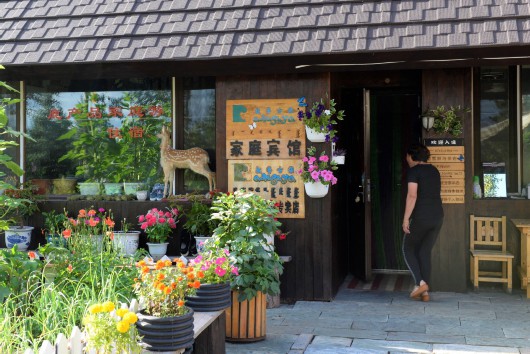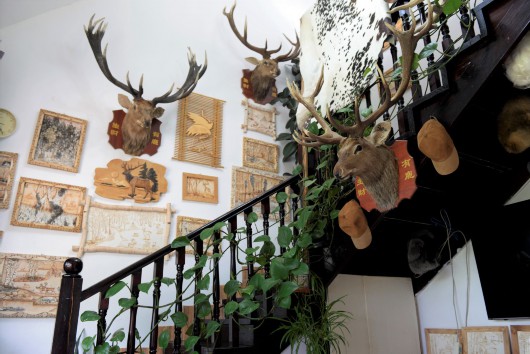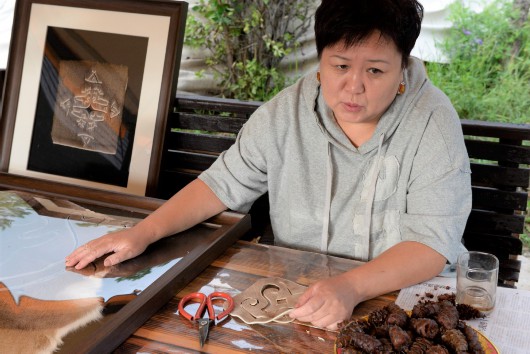中国日报|Ecological development revives, preserves Chinese reindeer tribe( 二 )
When talking of the future, Gu Musen decided to further expand the reindeer population and partner with schools on education, spreading the minority group's heritage from one generation to the next.

文章图片
Zhang Guofeng's family hotel at Aoluguya nationality township in Genhe, Inner Mongolia autonomous region, on Aug 6, 2020. [Photo by Zhao Shiyue/chinadaily.com.cn]
Zhang Guofeng, 58, who manages a family hotel with three rooms in Aoluguya, has also lifted herself out of the low-income group and found a way to wealth. After working away from home for over 10 years, Zhang and her husband have returned as tourism prospers in this remote forest area.
"All rooms are fully booked during the peak tourism season from July to August," said Zhang, "and my income reaches around 20,000 yuan for those two months."
Zhang is one of the ecological migrants of 62 Ewenki families who moved from mountains to the national minority community under the government's environmental protection project starting in 2002. With 160 million yuan of investment, local authorities constructed 32 units of two-tier houses in the city suburb, with 88 square meters each.
To maintain the balance between local inhabitants and natural resources, a permanent hunting ban was also enforced the same year.

文章图片
The interior of Zhang Guofeng's family hotel at Aoluguya nationality township in Genhe, Inner Mongolia autonomous region on Aug 6, 2020. [Photo by Zhao Shiyue/chinadaily.com.cn]
"Before 2003, the Ewenkis in Aoluguya earned a living via hunting wildlife and made only about 300 yuan a month, while their lives saw significant improvement after ecological migration," said Zhang Wanjun, head of the Aoluguya nationality township.
According to official statistics, the government has injected over 100 million yuan since 2003 to stimulate local tourism by taking advantage of the town's unique culture and natural resources.
By selling reindeer products and managing homestay businesses, the net income per capita of rural hunters soared from 1,277 yuan to around 20,000 yuan a year, statistics show.

文章图片
De Keli makes reindeer leather handicrafts at Aoluguya nationality township in Genhe, Inner Mongolia autonomous region, on Aug 6, 2020. [Photo by Zhao Shiyue/chinadaily.com.cn]
Although Ewenkis in Aoguluya have left the mountains and stepped into modern life, they still maintain the traditional lifestyle and remain devoted to preserving the tribe's precious cultural heritage.
De Keli, 48-year-old, has been making ethic clothing and leather handicrafts for nearly 20 years. As one of the intangible cultural heritage inheritors in Innner Mongolia autonomous region, she tries to integrate contemporary aesthetic ideas with Ewenki's traditional totems by engraving complex graphics on reindeer fur.
- 中国日报网|美国教师:教五岁的中国孩子“Say Hello” 我就可能坐牢?
- 中国日报网|国际奥委会官员:不管有没有新冠,东京奥运会明年如期办
- 中国日报网|国际奥委会协调委员会主席:不管有没有新冠病毒,东京奥运会将在明年如期举行
- 中国日报网|快讯!超过巴西,印度成为世界第二大确诊病例国家
- 中国日报微信公众号|学霸又一次出圈!应届硕士生被建议破格授予博士学位?网友却吵翻了……
- 中国日报网|用心守护“铁蘑菇”
- 中国日报网|赣南卫生健康职业学院教师走进直播间 与市民互动“趣味医学”
- 中国日报网|山东省第六届沿海骑行大奖赛在青岛即墨区开赛
- 中国日报网|长海县獐子岛海域出现“龙吸水”
- 中国日报网|印度:累计确诊超400万,GDP跌幅创记录
